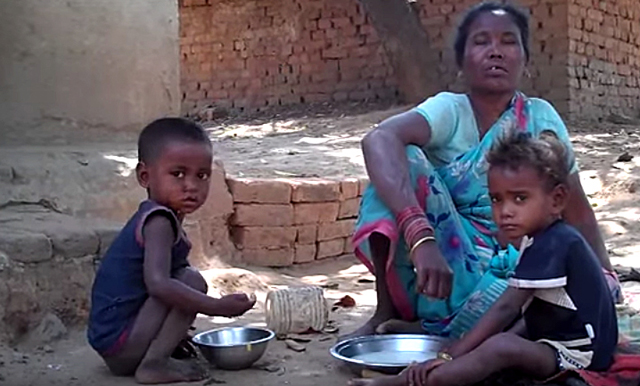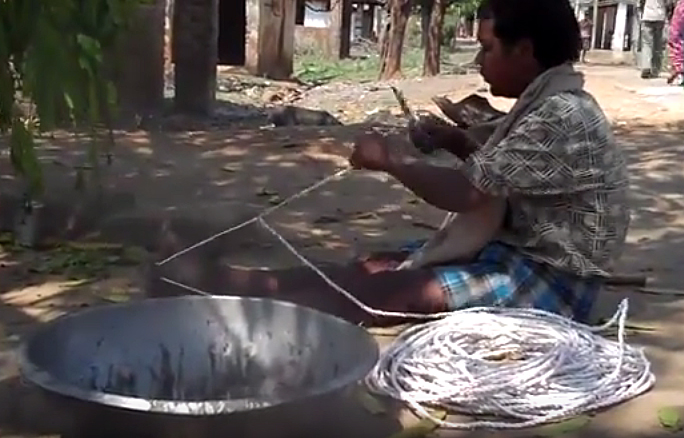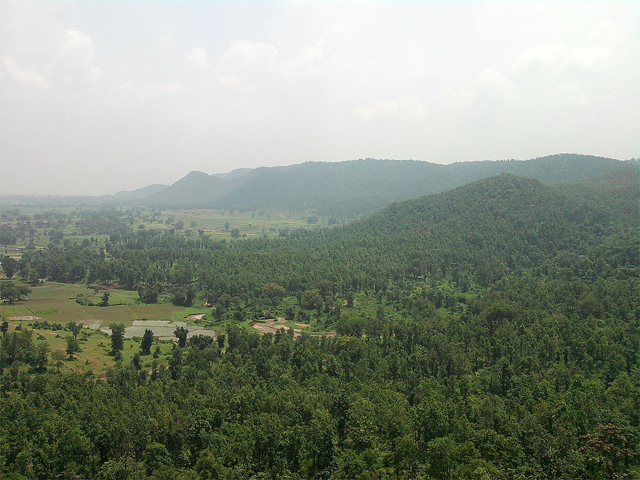As a way of observing the International Day of the World’s Indigenous Peoples on August 9, the Telegraph sent one of its reporters into the village of Chalkari, in Jharkhand, to speak with the Birhor people. One of their major difficulties, they told him, was that they are having problems with burying their dead during the monsoon rains.

Bara Sukar Birhor, the 65-year old head of the village of 47 families, located in the Topchanchi Block of the Dhanbad District in Jharkhand, told the reporter that the ground is swampy and digging a grave is difficult during the monsoon season. He elaborated for the Telegraph about the other issues they face in the community. Their government-built houses leak when it rains. Surviving on the government’s allocation of 35 kg of rice per month is difficult, particularly since they don’t have land to grow their own food.
Dal and vegetables, staples in the diets of many Indians, are luxuries for the Birhor of Chalkari. Mr. Birhor hopes that his four grandchildren will not have to live as poorly as he has. No one in the village has gotten schooling beyond Class VIII and he hopes his grandchildren will be able to do better.

Some of the young people in the village have taken construction jobs or work on farms. Others, according to Dinesh Birhor, a 22-year-old, have jobs laying railroad tracks in Ranchi, the capital city of the state of Jharkhand. Some women continue making ropes for sale. But the problems of poverty are paramount: alcoholism, illiteracy, unemployment.
However, there have been at least some improvements in Chalkari during the lifetime of the elderly village leader. A ration shop has opened as well as a primary-care health center. It is staffed by a doctor, two nurses, and a pharmacist. Patients with serious issues are referred to the medical facilities in Topchanchi, a nearby town of 6,000 people. The health officials recently handed out mosquito nets to the members of all the families in Chalkari.

Vijay Kumar, the Block Development Officer for the Topchanchi Block, told the newspaper that the Public Distribution System shop in Chalkari is run by a Birhor women’s self-help group. Asked about the lack of a proper burial ground for the village, he replied that it is an issue he is concerned about. Providing the Chalkari residents sufficient land needs to be addressed, he admitted. Most Birhor have leases within the forests of Jharkhand, but his administration is trying to work out a community lease for the people of the village. He is hoping to be able to send a proposal to the District Collector of the Dhanbad District, a higher level official, about the issue of providing a burial ground.
Ashutosh Mairh, who made a documentary in 2006 about the Birhor, told the reporter that they have been forest gatherers for centuries and the changes they are now facing are hard for them to adjust to. But asked to identify possible solutions, he said that the NGOs and the government agencies ought to try and build on the traditional strengths of particularly vulnerable tribes such as the Birhor. “For instance, Birhors have lived in forests and know about medicinal plants. This can be leveraged as a skill,” he suggested.
A news story posted in March 2017 described a report from the Hindustan Times in which Birhor from a different district in Jharkhand were complaining about not having the land to bury their dead. Birhor burial customs, described in some detail in that Peaceful Societies piece, need not be repeated here. Suffice it to suggest that the lack of burial plots for the landless Birhor appears to be a widespread problem throughout the state.